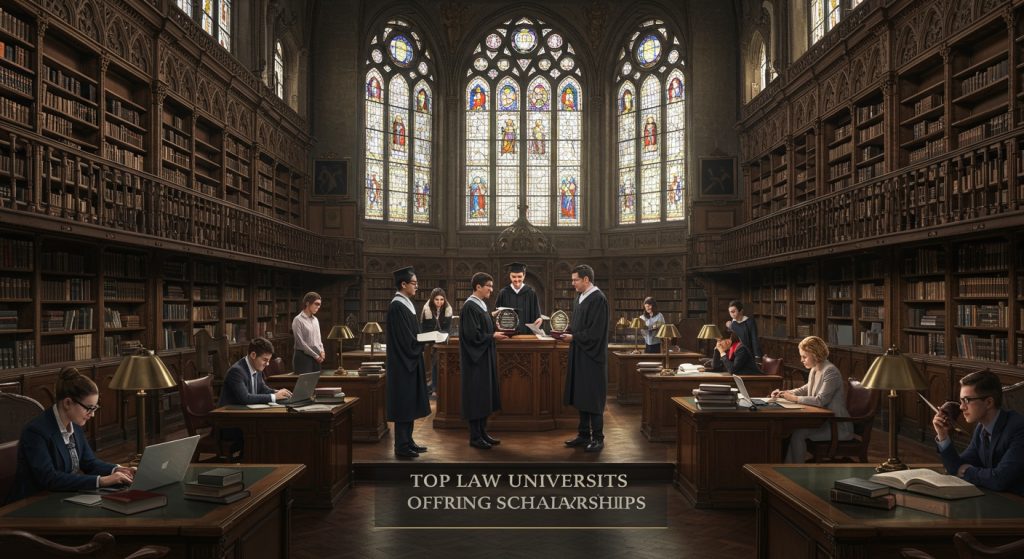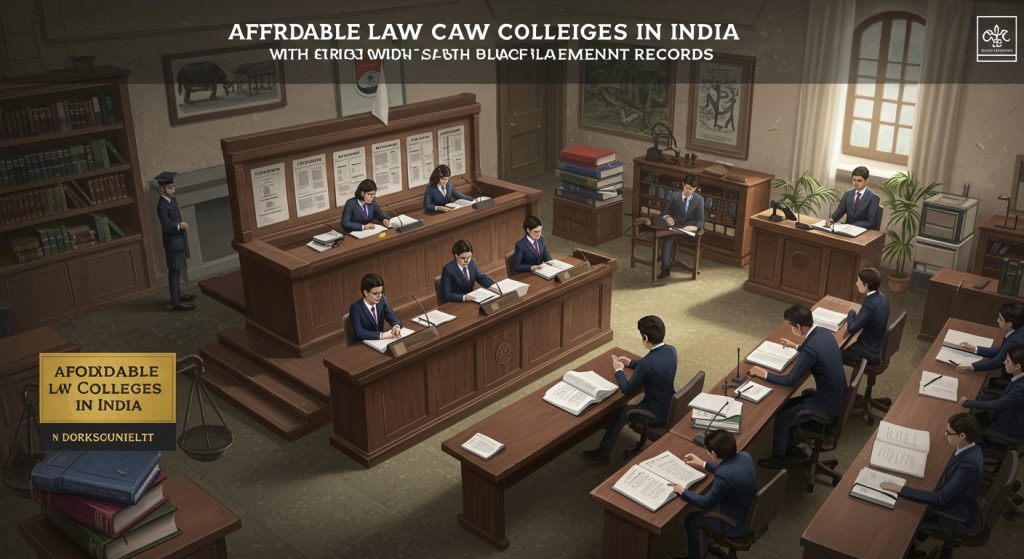Aspiring legal eagles, the path to jurisprudence often begins with a hefty price tag. But, merit and need-based scholarships offered by top law universities can significantly alleviate this burden. Imagine pursuing your Juris Doctor at institutions like Yale, Stanford, or Harvard, not just on your academic prowess. Also with substantial financial assistance. This overview highlights key benefits and learning outcomes of law programs coupled with scholarship opportunities. We will explore diverse funding avenues, dissect eligibility criteria. Spotlight specific programs known for their commitment to accessibility. From full-ride packages covering tuition and living expenses to specialized grants supporting specific fields of legal study, navigating the landscape of law school scholarships can be daunting. This resource aims to empower you with the knowledge to unlock these opportunities and make your legal dreams a reality.

Understanding Law School Scholarships
Law school is a significant investment. Scholarships can substantially reduce the financial burden. These scholarships are essentially financial aid awards that don’t need to be repaid. They are typically based on merit, need, or a combination of both.
- Merit-based scholarships: Awarded based on academic achievements, LSAT scores. Extracurricular activities.
- Need-based scholarships: Awarded based on the applicant’s financial situation.
- Diversity scholarships: Aim to promote diversity within the legal profession and are often awarded to students from underrepresented groups.
- Specialized scholarships: Target students with specific interests or backgrounds, such as those interested in public interest law or those with military service.
Top Universities Offering Law School Scholarships
Several prestigious law universities offer generous scholarship programs. Here’s a look at some notable institutions and their scholarship opportunities:
Yale Law School
Yale Law School is consistently ranked among the top law schools in the world. While known for its academic rigor, it also provides significant financial aid opportunities. Their need-based aid program is particularly robust. They also offer several merit-based scholarships to attract top talent.
Scholarship Example: The Yale Law School Fund Scholarship, primarily need-based, covers a substantial portion of tuition for many students.
Harvard Law School
Harvard Law School also boasts a comprehensive financial aid program. They provide need-based scholarships to a large percentage of their student body. Their commitment to accessibility makes it a viable option for students from diverse financial backgrounds.
Scholarship Example: The Dean’s Scholarship Fund, awarded based on both merit and need, is a popular option.
Stanford Law School
Stanford Law School offers a range of scholarships, including merit-based and need-based options. They are committed to making legal education accessible to qualified students regardless of their financial circumstances.
Scholarship Example: The Stanford Law School Grant, a need-based grant, provides significant financial assistance.
Columbia Law School
Columbia Law School provides various scholarship opportunities, including merit-based scholarships and need-based grants. They have a strong focus on supporting students pursuing public interest law.
Scholarship Example: The Public Interest Law Foundation (PILF) Grant assists students working in unpaid public interest internships during the summer.
University of Chicago Law School
The University of Chicago Law School offers a range of scholarships, including the prestigious Olin Scholarship, which is awarded based on academic merit. They also provide need-based aid to help students finance their legal education.
Scholarship Example: The Olin Scholarship, a merit-based award, covers a significant portion of tuition.
New York University (NYU) School of Law
NYU School of Law is known for its commitment to public service and offers various scholarships to support students pursuing careers in this field. They also offer merit-based and need-based scholarships.
Scholarship Example: The Root-Tilden-Kern Scholarship, awarded to students committed to public service, provides full tuition and a stipend.
University of Pennsylvania Carey Law School
Penn Carey Law offers a comprehensive financial aid program, including merit-based and need-based scholarships. They are dedicated to making legal education accessible to talented students from all backgrounds.
Scholarship Example: The Levy Scholars Program, a merit-based scholarship, recognizes academic excellence.
University of Michigan Law School
The University of Michigan Law School provides a variety of scholarships, including merit-based awards and need-based grants. They are committed to supporting students from diverse backgrounds.
Scholarship Example: The Darrow Scholarship, awarded based on merit, covers a significant portion of tuition.
University of California, Berkeley School of Law
UC Berkeley School of Law offers a range of scholarships, including need-based grants and merit-based awards. They are committed to promoting diversity and inclusion in the legal profession.
Scholarship Example: The Berkeley Law Opportunity Scholarship, a need-based grant, provides financial assistance to students from low-income backgrounds.
University of Virginia School of Law
The University of Virginia School of Law offers a variety of scholarships, including merit-based and need-based options. They are committed to attracting and supporting talented students from all walks of life.
Scholarship Example: The Hardy Cross Dillard Scholarship, awarded based on merit, covers a significant portion of tuition.
Navigating the Scholarship Application Process
Applying for law school scholarships requires careful planning and attention to detail. Here are some key steps:
- Research: Thoroughly research the scholarship opportunities offered by each law school you are considering. Pay attention to eligibility requirements, deadlines. Application materials.
- LSAT Preparation: A high LSAT score can significantly increase your chances of receiving a merit-based scholarship. Invest time and effort in preparing for the LSAT.
- Personal Essay: Craft a compelling personal essay that highlights your academic achievements, extracurricular activities. Commitment to the legal profession.
- Letters of Recommendation: Request letters of recommendation from professors or mentors who can speak to your academic abilities and potential.
- Financial Aid Application: Complete the Free Application for Federal Student Aid (FAFSA) and any other required financial aid forms.
- Meet Deadlines: Pay close attention to application deadlines and submit all required materials on time.
Maximizing Your Chances of Receiving a Scholarship
Several strategies can help you increase your chances of receiving a law school scholarship:
- Apply Early: Applying early in the admission cycle can increase your chances of receiving a scholarship.
- Negotiate: Don’t be afraid to negotiate your scholarship offer with the law school. If you have received a better offer from another school, let them know.
- Consider Smaller Schools: Smaller or less prestigious law schools may offer more generous scholarship packages to attract top students.
- Explore External Scholarships: Research and apply for external scholarships offered by organizations such as AccessLex Institute or Sallie Mae.
The Importance of a Strong LSAT Score
The Law School Admission Test (LSAT) is a standardized test administered by the Law School Admission Council (LSAC). It is a crucial factor in the law school admission process and plays a significant role in scholarship eligibility. A high LSAT score demonstrates your critical thinking, reading comprehension. Analytical reasoning skills, making you a more attractive candidate for merit-based scholarships. Here is some additional data about Top Law Schools: Public Versus Private Options Top Law Schools: Public Versus Private Options
The Role of Diversity in Scholarship Awards
Many law schools are committed to promoting diversity and inclusion within the legal profession. Diversity scholarships are often awarded to students from underrepresented groups, such as racial and ethnic minorities, students from low-income backgrounds. Students with disabilities. These scholarships aim to create a more diverse and equitable legal field.
Public Interest Law Scholarships
Students interested in pursuing careers in public interest law may be eligible for specialized scholarships. These scholarships often provide financial assistance to students working in unpaid internships or fellowships in public interest organizations. They can also help offset the lower salaries typically associated with public interest law positions.
Conclusion
The Road Ahead Securing a scholarship to a top law university is an ambitious goal. Understanding which institutions offer substantial financial aid is half the battle. We’ve explored pathways to accessing these opportunities, highlighting institutions that prioritize accessibility alongside academic excellence. Looking ahead, the legal landscape is rapidly evolving, demanding lawyers who are not only academically brilliant but also possess strong ethical compasses and innovative problem-solving skills. Your next steps should involve meticulously researching the specific scholarship requirements for each university that aligns with your academic profile and career aspirations. Don’t underestimate the power of a compelling personal essay that showcases your passion for law and your commitment to making a difference. Remember, the journey to becoming a lawyer is challenging but incredibly rewarding. Believe in your potential, persevere through the application process. Visualize yourself succeeding in your chosen field. The legal profession needs passionate individuals like you to shape a more just and equitable future.
FAQs
Okay, so which law schools are known for really good scholarship programs?
That’s the million-dollar question, isn’t it? While it changes a bit year to year, schools like Yale, Harvard, Stanford. The University of Chicago consistently offer substantial aid packages. Look beyond the Ivies too! Georgetown, NYU. Columbia also have pretty generous need-based and merit-based scholarships. Don’t just assume the price tag you see is what you’ll pay – do your homework!
What kind of scholarships are we talking about here? Are they all based on grades?
Not at all! While stellar grades and LSAT scores definitely help you snag merit-based scholarships (think: ‘you’re awesome, we want you’), many scholarships are need-based. This means they look at your family’s financial situation to determine how much assistance you need. Some are even specifically for students from underrepresented backgrounds or those pursuing certain areas of law. There are also external scholarships from organizations outside the universities to explore.
How competitive are these scholarships, really?
Let’s be real, they’re pretty darn competitive! Top law schools attract top students, so you’re up against some seriously bright folks. Don’t be discouraged though. A strong application, compelling personal statement. Demonstrating a genuine passion for law can make you stand out, even if your numbers aren’t perfect.
If I get a scholarship, does it usually cover everything?
Unfortunately, scholarships rarely cover 100% of tuition and living expenses. Full-ride scholarships are out there. Incredibly rare and competitive. Most scholarships will cover a significant portion. You’ll likely still need to consider loans or other funding sources to cover the remaining costs. Always read the fine print about what is and isn’t covered.
When should I start looking into scholarships? Like, really start?
As soon as you start thinking seriously about law school! Research schools and their scholarship opportunities early. The application process can be lengthy. Deadlines often come earlier than you might expect. Plus, knowing what’s available can help you make informed decisions about where to apply in the first place.
Besides GPA and LSAT, what else do these schools look for in scholarship applications?
They want to see the whole picture! Your personal statement is HUGE – it’s your chance to show them who you are, why you want to study law. What makes you unique. They’ll also look at your extracurricular activities, work experience. Letters of recommendation to get a sense of your character, leadership potential. Commitment to making a difference.
Is it worth applying to schools that are known for being expensive even if I need a lot of financial aid?
Absolutely! Don’t rule out any school just because of the sticker price. Top schools often have the largest endowments and can offer surprisingly generous financial aid packages. It’s better to apply and see what kind of aid you’re offered than to self-select out of the running. You might be surprised!



